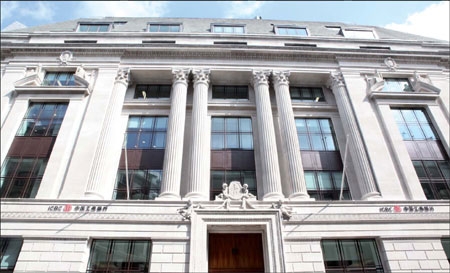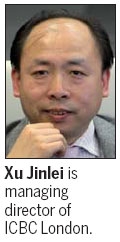Betwixt the beefeaters and the old lady
Updated: 2012-04-20 11:14
By Diao Ying (China Daily European Edition)
|
|||||||||||
|
 ICBC recently relocated its London operation to an office building that is in the capital's financial district. [Diao Ying / China Daily] |
Chinese banking giant finds local niche in London
The six-story building of the Industrial and Commercial Bank of China Ltd in London is well positioned between two of the capital's major landmarks. Ten minutes' walk in one direction is the Tower of London and five minutes' walk the other way is the famed Old Lady of Threadneedle Street, the Bank of England.
But when you step into the bank building you are suddenly in the Orient. The lights that hang from the ceiling are white, and shaped like Chinese lanterns. Windows are decorated with black wooden grids, something you would see in a traditional Chinese home. Plants such as bamboo stand in corners, and meeting areas are separated with orange screens. All of this, surprisingly, from a Western designer.
A delicate balance between East and West is what Xu Jinlei, managing director of ICBC's operation in London, is trying to achieve. Despite its reputation as China's most well recognized bank - and leaving aside the fact that ICBC is the world's largest bank by market capitalization - it wants to establish an image as a local bank in the Western financial hub.
"We comply with regulations of local authorities and carry out our business with professional practice," Xu says. "Our strategy is to let our clients see us as a local bank, instead of a Chinese one."
To a certain extent the goal has been achieved. About 75 percent of its staff are local. It also generates most of its revenue from international firms instead of Chinese companies. In fact, the money that it made from local business has been enough for it to buy the building housing its offices at the prominent location in King William Street, EC4.
"The new office building shows our commitment to the market," Xu says. "It is also a necessity: our old office is no longer big enough to support all the functions and growing business."
The London bank's profit last year was about $30 million (23 million euros). Xu estimates that the profit for this year will be even bigger.
|
 |
The achievement did not come easily as ICBC started with distinct disadvantages when it entered the British market. ICBC (London) Plc was established in 2003 after the bank set up its representative office in London in 1995. ICBC in China is strong in retail banking, a highly competitive area in Britain dominated by banking giants such as HSBC and LBG. Serving Chinese companies in Europe seemed to be a natural choice, but the trading volume was too small, and the more established firms had already formed close ties with local financial institutions before ICBC arrived.
"We were in a very difficult position, and we had to find our own way of doing business in London," says Xu, who has worked at ICBC in London since 2005, after working at the bank's headquarters in Beijing and in its office in Tokyo.
It had to find a niche of its own to survive and grow, Xu says. A new field it found was to act as a bridge in trade between China and European markets. London has always been a potential source for companies in the Middle East, Europe and Africa seeking investments, which explains its location and its role as the international financial center. ICBC has found a new customer base as more companies in these regions seek to export commodities and raw materials to China.
The close ties between ICBC London and its headquarters in China help. Other banks may hesitate to offer loans to a company from a different continent that it knows little about. ICBC's domestic link means the bank can check the credit worthiness of the company's importers in China. Combining this with some structural arrangements of loans, the bank can reduce risk and maximize profit. After all, striking a balance between the two is what banking is about, Xu says.
The ICBC office in London also acts as a platform for foreign exchange and precious metals trading for its parent bank in Beijing. In China the bank makes a lot of money from foreign exchange and precious metals trading as Chinese consumers flock to gold as a solid investment.
The London office, working with Beijing and New York, helps facilitate the trade across the globe. Xu says the bank is considering adding commodity trading at some point. China's appetite for commodities is skyrocketing, but most of the work is done by Western investment banks. Xu expects that business in this area for Chinese banks will increase rapidly, and he hopes that the London office will be involved in part of that business in the future.
The financial crisis has also provided many opportunities for ICBC. Some were attracted to Chinese banks as many Western banks faced problems. And ICBC also marketed itself to win more clients.
It faces some bottlenecks after five years of rapid expansion. The financial regulatory authority has tightened its regulation on banks after the financial crisis. Now it has higher requirements on banks' capital and liquidity, posing more challenges for ICBC London.
"The increase in demand for finance has outpaced the increase of funding, and that is the difficult part," Xu says. After all, it is still a relatively small bank compared with big local banks.
But a new opportunity seems to be on the way as the British treasury and the People's Bank of China discuss making London an offshore center for yuan trading. On April 18, the banking and financial services company HSBC Holdings Plc introduced first yuan-denominated bond to be offered in London.
Xu says the internationalization of the yuan could be another chance for the bank to develop its business here.
On the supply side ICBC has the widest retail network in China, and probably the largest pool of renminbi deposits. On the demand side China's 1.3 billion people means vast potential for Western companies.
"If they sell so many things in China, why can't they settle their trade in renminbi?" Xu says. "And if they do, ICBC would be a natural choice."
ICBC London is preparing itself for changes, he says. "We're not there yet, but it will happen sooner or later."
diaoying@chinadaily.com.cn
Today's Top News
Rescuers race against time for quake victims
Telecom workers restore links
Coal mine blast kills 18 in Jilin
Intl scholarship puts China on the map
More bird flu patients discharged
Gold loses sheen, but still a safe bet
US 'turns blind eye to human rights'
Telecom workers restore links
Hot Topics
Lunar probe , China growth forecasts, Emission rules get tougher, China seen through 'colored lens', International board,
Editor's Picks

|

|

|

|

|

|





